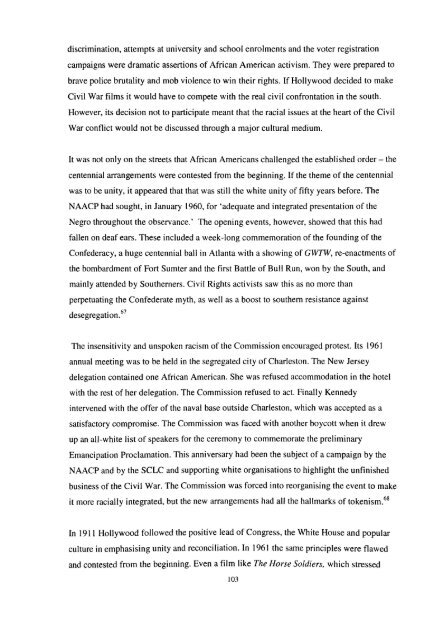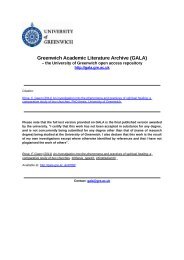Download (3483kB) - Greenwich Academic Literature Archive ...
Download (3483kB) - Greenwich Academic Literature Archive ...
Download (3483kB) - Greenwich Academic Literature Archive ...
- No tags were found...
Create successful ePaper yourself
Turn your PDF publications into a flip-book with our unique Google optimized e-Paper software.
discrimination, attempts at university and school enrolments and the voter registrationcampaigns were dramatic assertions of African American activism. They were prepared tobrave police brutality and mob violence to win their rights. If Hollywood decided to makeCivil War films it would have to compete with the real civil confrontation in the south.However, its decision not to participate meant that the racial issues at the heart of the CivilWar conflict would not be discussed through a major cultural medium.It was not only on the streets that African Americans challenged the established order - thecentennial arrangements were contested from the beginning. If the theme of the centennialwas to be unity, it appeared that that was still the white unity of fifty years before. TheNAACP had sought, in January 1960, for 'adequate and integrated presentation of theNegro throughout the observance.' The opening events, however, showed that this hadfallen on deaf ears. These included a week-long commemoration of the founding of theConfederacy, a huge centennial ball in Atlanta with a showing of GWTW, re-enactments ofthe bombardment of Fort Sumter and the first Battle of Bull Run, won by the South, andmainly attended by Southerners. Civil Rights activists saw this as no more thanperpetuating the Confederate myth, as well as a boost to southern resistance againstdesegregation. 67The insensitivity and unspoken racism of the Commission encouraged protest. Its 1961annual meeting was to be held in the segregated city of Charleston. The New Jerseydelegation contained one African American. She was refused accommodation in the hotelwith the rest of her delegation. The Commission refused to act. Finally Kennedyintervened with the offer of the naval base outside Charleston, which was accepted as asatisfactory compromise. The Commission was faced with another boycott when it drewup an all-white list of speakers for the ceremony to commemorate the preliminaryEmancipation Proclamation. This anniversary had been the subject of a campaign by theNAACP and by the SCLC and supporting white organisations to highlight the unfinishedbusiness of the Civil War. The Commission was forced into reorganising the event to makeit more racially integrated, but the new arrangements had all the hallmarks of tokenism. 68In 1911 Hollywood followed the positive lead of Congress, the White House and popularculture in emphasising unity and reconciliation. In 1961 the same principles were flawedand contested from the beginning. Even a film like The Horse Soldiers, which stressed103
















